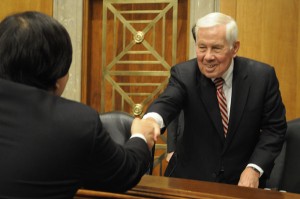WASHINGTON — Republican senators on a key committee sparred with the Obama administration’s point man on the War Powers Resolution, Harold Koh, at a hearing Tuesday ahead of a crucial afternoon vote on what to do about U.S. military efforts in Libya.
The Senate Foreign Relations hearing, the fifth on Libya since March, preceded a vote on a bipartisan bill introduced by Sen. John Kerry, D-Mass, and supported by Sen. John McCain, R-Ariz., authorizing the administration to continue using limited force in Libya for a year. The bill passed 14-5 as four Republicans voted with the Democratic majority. If passed by both houses of Congress, the bill would effectively end the debate over whether President Barack Obama can continue using American forces in the Libyan operation.

Harold Koh and Sen. Lugar, R-Ind, shake say hello before Koh testifies to the Senate Foreign Relations Committee
Koh told the committee that the president was acting lawfully on Libya because it was an unusual set of circumstances, with international approval, no casualties and a limited role for the U.S. The War Powers Resolution, according to Koh, should not be a “one size fits all straight jacket,” but allow for political judgment.
Republicans pressed Koh on why he believes the White House has the power to act without congressional approval.
“When U.S. forces engage in a limited military mission that involves limited exposure for U.S. troops and a limited risk of serious escalation, and employs limited military means, we are not in hostilities of the kind envisioned by the War Powers Resolution,” Koh said.
GOP senators pushed back hard on that assertion.
Republican Sen. Richard Lugar of Indiana, the committee’s ranking member, said that just because U.S. armed forces are not pulling the trigger does not mean the country is not involved in acts of war, and that involvement in Libya was essentially a decision to intervene in that nation’s civil war.
“If we do not have some ground rules, the War Powers Act may be one area where we try to work this thing out,” Lugar said, “this country could decide to intervene in numerous civil wars, could decide to affect the governance of people all over the world.”
Sen. Corker, R-Tenn., asked Koh if the administration was glad it had chosen to continue the operations without congressional approval. Corker said Koh had undermined the credibility of the administration and the War Powers Resolution — and done a disservice to the country.
Corker pointedly questioned Koh. “Are you glad that you basically created an issue where no issue had to exist by taking this narrowly defined route and basically sticking a stick in the eye of Congress? Is this something that you are glad you’ve done?”
Koh defended the administration, saying the actions were not meant with any disrespect to Congress.
Kerry responded lawmakers failed to act after receiving Obama’s letter to Congress on March 21, and that he would not sit around and let others throw darts at the White House.
“You are saying the president violated the process here and didn’t come to Congress. He did come to Congress. He sent us a letter requesting the authorization and we didn’t do it,’ Kerry said.
Other senators asked Koh about combat pay for forces in Libya, the recognition of the Traditional National Council in Libya, and the possibilities of unfreezing Libyan assets. Two other witnesses were asked to return to the committee at a later date.
